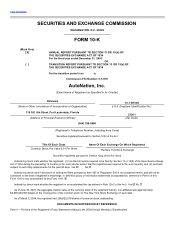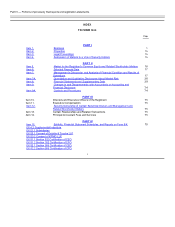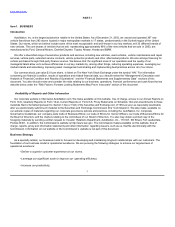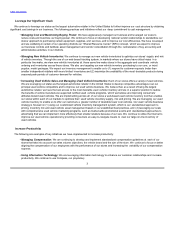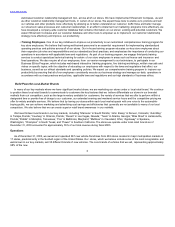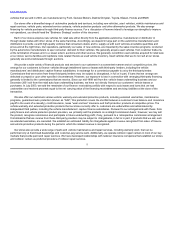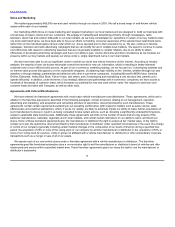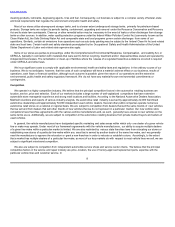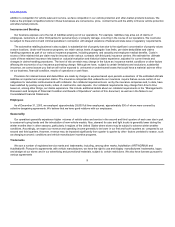AutoNation 2003 Annual Report Download - page 10
Download and view the complete annual report
Please find page 10 of the 2003 AutoNation annual report below. You can navigate through the pages in the report by either clicking on the pages listed below, or by using the keyword search tool below to find specific information within the annual report.
Table of Contents
cleaning products, lubricants, degreasing agents, tires and fuel. Consequently, our business is subject to a complex variety of federal, state
and local requirements that regulate the environment and public health and safety.
Most of our stores utilize aboveground storage tanks, and to a lesser extent underground storage tanks, primarily for petroleum-based
products. Storage tanks are subject to periodic testing, containment, upgrading and removal under the Resource Conservation and Recovery
Act and its state law counterparts. Clean-up or other remedial action may be necessary in the event of leaks or other discharges from storage
tanks or other sources. In addition, water quality protection programs under the federal Water Pollution Control Act (commonly known as the
Clean Water Act), the Safe Drinking Water Act and comparable state and local programs govern certain discharges from some of our
operations. Similarly, certain air emissions from operations such as auto body painting may be subject to the federal Clean Air Act and related
state and local laws. Certain health and safety standards promulgated by the Occupational Safety and Health Administration of the United
States Department of Labor and related state agencies also apply.
Some of our stores are parties to proceedings under the Comprehensive Environmental Response, Compensation, and Liability Act, or
CERCLA, typically in connection with materials that were sent to former recycling, treatment and/or disposal facilities owned and operated by
independent businesses. The remediation or clean-up of facilities where the release of a regulated hazardous substance occurred is required
under CERCLA and other laws.
We incur significant costs to comply with applicable environmental, health and safety laws and regulations in the ordinary course of our
business. We do not anticipate, however, that the costs of such compliance will have a material adverse effect on our business, results of
operations, cash flows or financial condition, although such outcome is possible given the nature of our operations and the extensive
environmental, public health and safety regulatory framework. We do not have any material known environmental commitments or
contingencies.
Competition
We operate in a highly competitive industry. We believe that the principal competitive factors in the automotive retailing business are
location, service, price and selection. Each of our markets includes a large number of well-capitalized competitors that have extensive
automobile store managerial experience and strong retail locations and facilities. According to the National Automotive Dealers Association,
Manheim Auctions and reports of various industry analysts, the automotive retail industry is served by approximately 22,000 franchised
automotive dealerships and approximately 54,000 independent used vehicle dealers. Several other public companies operate numerous
automotive retail stores on a national or regional basis. We are subject to competition from dealers that sell the same brands of new vehicles
that we sell and from dealers that sell other brands of new vehicles that we do not represent in a particular market. Our new vehicle store
competitors have franchise agreements with the various vehicle manufacturers and, as such, generally have access to new vehicles on the
same terms as us. Additionally, we are subject to competition in the automotive retailing business from private market buyers and sellers of
used vehicles.
In general, the vehicle manufacturers have designated specific marketing and sales areas within which only one dealer of a given vehicle
line or make may operate. Under most of our framework agreements with the vehicle manufacturers, our ability to acquire multiple dealers
of a given line-make within a particular market is limited. We are also restricted by various state franchise laws from relocating our stores or
establishing new stores of a particular line-make within any area that is served by another dealer of the same line-make, and we generally
need the manufacturer to approve the relocation or grant a new franchise in order to relocate or establish a store. Accordingly, to the extent
that a market has multiple dealers of a particular line-make, as most of our key markets do with respect to most vehicle lines we sell, we are
subject to significant intra-brand competition.
We also are subject to competition from independent automobile service shops and service center chains. We believe that the principal
competitive factors in the service and repair industry are price, location, the use of factory-approved replacement parts, expertise with the
particular vehicle lines and customer service. In
8

